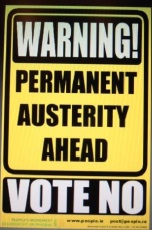By Anthony Coughlan, Director, The National Platform EU Research and Information Centre
“The Member States whose currency is the euro may
establish a stability mechanism to be activated if indispensable to
safeguard the stability of the euro area as a whole. The granting of any
required financial assistance under the mechanism will be made subject
to strict conditionality.”
- Proposed amendment to Article 136 TFEU of the EU Treaties by which the
27 EU Member States authorize the 17 Member States of the euro currency
area to establish a Stability Mechanism
INTRODUCTION
This amendment to the EU Treaties has still to be approved by Ireland
in accordance with its constitutional requirements under the
“simplified” EU treaty amendment procedure of Article 48.6 TEU. The
European Council decision to insert the Article 136 TFEU amendment into
the EU Treaties comes into force on 1 January 2013 if by that time it
has been approved by all 27 Member States in accordance with their
constitutional requirements. The ESM Institution which the 17 Eurozone
States seek to establish and which Ireland would become a Member of is
set out in the ESM Treaty. This treaty cross-refers to the
Fiscal/Stability Treaty on which we vote on 31 May. The ESM Treaty
states that it is “complementary” to the Fiscal/Stability Treaty. The
Government has promised the other 16 Eurozone Governments that it will
have the ESM Treaty ratified by July, but without the necessary
constitutional referendum being held on the Treaty and the Art. 136
amendment which authorizes it.
Q. Where will we get the money if we vote No on 31 May?
A.
Where will the Government get the money to pay the €11
billion the ESM Treaty will require from us, with an open-ended treaty
commitment to pay further sums thereafter without limit?
Q. But where will we still get the money ?
A.
We will get it by holding a referendum on the Article 136
TFEU amendment and the ESM Treaty, as that is constitutionally necessary
in order to authorize these proposals as they stand. The 16 other
Eurozone States will have to persuade us to vote Yes in such a
referendum if they are to establish the kind of Stability Mechanism
which the ESM Treaty envisages. They can do this by agreeing to forgive
the private bank debt they have insisted should be imposed on Irish
taxpayers, plus the Anglo-Irish promissory notes etc. A referendum can
also be used to press the Eurozone authorities to agree a growth
strategy for the Eurozone instead of the present failed austerity
policies.
———————————————
Sunday 6 May 2012
DEAR DR BARRETT,
It is quite wrong of you to state in your Irish Times op-ed article
of last Friday that No-side advocates in the current referendum are “
threatening to veto an institution as vital as the ESM”.
Yet you make no mention of the €11 billion which the ESM Treaty
requires Ireland to contribute in different forms of capital to the
Stability Mechanism the ESM Treaty proposes – with €1.6 billion up front
“
irrevocably and unconditionally” (ESM Treaty Art.8) and a blank cheque in the treaty to paying in further sums without limit in future as required.
WHY IRELAND HAS A VETO ON THE ARTICLE 136 TFEU AMENDMENT TO THE EU TREATIES, AND THE ESM TREATY WHICH THIS AMENDMENT AUTHORISES
Those on the No-side who know what they are talking about are saying
that the ESM Treaty and the Article 136 TFEU amendment to the EU
Treaties which authorises a “Stability Mechanism” should be put to
referendum in Ireland before we can either ratify the ESM Treaty or
approve this Article 136 TFEU amendment in accordance with the
provisions of EU law and the terms of our Constitution.
This is
(a) because a permanent commitment to the ESM as a new Eurozone
Institution of which Ireland becomes a “Member”, together with its
accompanying rules and its extraordinary legal and taxation immunities
for its Board of Governors and personnel, entail a drastic surrender of
most of what is left of Irish State sovereignty; and
(b) because if the amendment to Article 136 TFEU quoted above is
lawfully to permit a Stability Mechanism for the Eurozone of the kind
set out in the ESM Treaty – a Mechanism which would effectively
contravene a number of existing EU Treaty articles – then a different
method of amendment of the EU Treaties needs to be adopted than the
method being employed in the present instance.
It is therefore the No-side people who are seeking to defend EU law
and the integrity of the EU Treaties by pointing this out and calling
for the Article 136 TFEU authorisation and the ESM Treaty which it
purports to authorise to be ratified in the only manner that is lawful
under the EU Treaties and constitutional in Ireland – namely, by way of
referendum of the people. It is a pity that your article fails to
acknowledge this.
WHY UNANIMITY AMONG THE 17 EUROZONE STATES IS REQUIRED TO APPROVE OR RATIFY ANY STABILITY MECHANISM FOR THE EURO AREA COUNTRIES
I am surprised that you do not acknowledge that the express terms of
the Article 136 TFEU authorisation quoted above require unanimity
amongst the 17 Euro area States for the establishment of any Stability
Mechanism the latter may decide to set up.
If you look at the words of the proposed Article 136 TFEU
authorisation, you will see that it does not say that “Member States”,
meaning some of them, may set up a Stability Mechanism, but “
THE Member States”, meaning all of them (In French it is “
LES membres” as against “
DES membres”).
The ESM Treaty as it stands provides that it can come into force when
Eurozone States contributing 90% of the capital have ratified it. The
eight biggest of the 17 Eurozone States can do this, thereby bringing
the Stability Mechanism into being, even though they would be a minority
of the countries of the euro area. How then can the Stability Mechanism
for the 17 that is envisaged in the ESM Treaty be for “
the euro area as a whole”, as required by the Article 136 authorisation by the 27 EU Member States quoted above?
There are other, legally weightier, reasons for unanimity being
required for ratification of an ESM Treaty of the kind the Government
will be asking the Oireachtas to ratify in June, immediately our
referendum on 31 May is over, but this point will do for now.
THE ESM TREATY IS THE WAY TO THE “FEDERATION FOR THE EUROZONE, A
CONFEDERATION FOR THE REST OF THE EU” WHICH NICOLAS SARKOZY CALLED FOR
LAST NOVEMBER
The ESM proposed in the ESM Treaty would radically restructure the
rules of the Economic and Monetary Union which Ireland joined under the
Maastricht and Lisbon Treaties. Having failed to obey the 3% and 60% of
GDP “excessive deficit rules” set out in those treaties, Germany and
France are now proposing to put the EMU on an entirely different basis
than hitherto by means of this new EU Institution, the ESM. They thereby
want to override the “no bailout” rule of Article 125 TFEU which
forbids EU loans to Governments so that the proposed ESM can do this,
something that is forbidden under the current EU treaties.
Germany and France, are seeking in this way to by-pass the rules of
the current EMU and carve out a legal path to what French President
Nicolas Sarkozy has called for, “
A Federation for the Eurozone and a Confederation for the rest of the EU”.
The ESM Treaty envisages this new ESM Institution with its giant €700
billion associated fund as becoming in effect a new Bank-cum-Finance
Ministry for this Eurozone Federation of the future.
WHY THE WRONG TREATY REVISION METHOD IS BEING USED TO INSERT
ARTICLE 136 TFEU INTO THE EU TREATIES IF THIS AMENDMENT IS TO VALIDATE
THE ESM TREATY AS IT STANDS
The 27 EU Member States are of course legally entitled to amend the
EU Treaties in order to permit the establishment of a Stability
Mechanism for the 17 Eurozone States of the radical kind proposed in the
ESM Treaty – as long as they do that by the legally proper method
governing the revision or amendment of the Treaties as set out in
Article 48 TEU.
It looks very probable that if Article 136 TFEU is lawfully to permit
an ESM of the radical character envisaged by the proposed ESM Treaty,
then the EU Treaties need to be amended by the procedure set out in
Article 48.2 of the Treaty on European Union(TEU), the so-called “
ordinary treaty revision procedure”, rather than by “
simplified treaty revision procedure”
of Article 48.6 TEU which is currently being used. As you know, this
“simplified” treaty revision procedure was inserted into the EU Treaties
by the Treaty of Lisbon. It allows the European Council of EU Prime
Ministers and Presidents to amend the treaties by a “Decision” among
themselves to do that – such a Decision being subject to subsequent
constitutional approval by their respective Member States.
See a copy of the European Council Decision enclosed, taken from the
EU Official Journal. The Prime Ministers and Presidents on the European
Council did not sign anything when they took this Decision on 25 March
2011. They took that Decision collectively amongst themselves, but it
must still be constitutionally approved by their National Parliaments or
by referendum of their peoples. The constitutional process of approving
that Decision is analogous to, but not the same, as the process of
ratification of a treaty following its signature. The Decision may well
not be constitutionally approved, just as a Treaty may not be ratified.
This EU “simplified treaty amendment procedure” is a form of legal
short-cut which is meant to deal with minor technical amendments that do
not require a full intergovernmental conference to amend the EU
Treaties, followed by a lengthy treaty ratification process. This
“simplified treaty amendment procedure” was however never meant to
provide for such a radical scheme as the fundamental restructuring of
the Economic and Monetary Union which the ESM Treaty as it stands
proposes. This ESM Treaty is tantamount to an attempt to organize a
legal-political coup to override the EU Treaty provisions on which the
existing EMU is based. Hence the proposed Article 136 TFEU amendment is
almost certainly being “approved” in the wrong way under EU law if it is
taken as authorizing the ESM Treaty that Messrs Kenny and Gilmore want
to ratify by July 2012.
I am informed that this is a central issue in the constitutional
challenge to the amendment to Article 136 TFEU and the ESM Treaty which
has been launched in the High Court by Donegal Independent TD Thomas
Pringle. Thomas Pringle is seeking to defend EU law, the integrity of
the EU Treaties and the Irish Constitution by his legal action. He
deserves the support of every democrat and patriotic Irish person. It
would be helpful if you would consider in some future Irish Times
article the important legal and constitutional issues which Thomas
Pringle’s brave challenge raises.
DR GAVIN BARRETT’S CONTENTION THAT THE ARTICLE 136 EU TREATY
AMENDMENT IS “UNNECESSARY” FOR THE ESM TREATY’S STABILITY MECHANISM TO
BE ESTABLISHED?
I am truly surprised to see such a distinguished exponent of European law as yourself write in your article that, “
It is far from clear that the Article 136 TFEU amendment is really necessary in order to set up the ESM”.
If that is so, why do all 27 EU Member States think it necessary to
insert the Article 136 TFEU amendment quoted above into the Treaties?
The EU is a Union governed by law, The Member States do not amend the EU
Treaties without cause. Why are all 27 EU countries currently going
through their constitutional processes for approving the European
Council Decision to amend the EU Treaties to permit the establishment of
a Stability Mechanism for the Eurozone if, as you say in your article,
”it is far from clear” that this is necessary? Are you really suggesting
that the legal advisers of 27 EU Governments are all wrong?
You mention in last Friday’s article that the ESM’s temporary
predecessor, the three-year EFSF loan fund set up for Greece in 2010 and
from which Ireland and Portugal later got their bailouts, was
”successfully set up” under another treaty article – Art.122 TFEU to be
precise – but you are well aware doubtless that this article was never
meant for such a purpose.
That EU Treaty Article deals with mutual aid between EU Member States
in the event of natural disasters. It was clearly not meant to cover
sovereign bailouts for Eurozone countries which had got into a financial
mess because they failed to obey the 3% and 60% “excessive deficit
rules” of the existing EMU. That is why an entirely new legal provision
has to be inserted into the EU Treaties – namely, the proposed amended
Article 136 TFEU – in order to provide a proper legal base for the
proposed permanent ESM loan fund of €700 billion for the Eurozone,
together with all the other radical things this new ESM Institution
would do, of which the 17 Eurozone States would become “Members”. How
does one become a member of a “Mechanism” by the way?
MONETARY POLICY FOR THE EURO AREA IS AN “EXCLUSIVE EU COMPETENCE”
AND NOT SOMETHING AN EU SUB-GROUP OF 17 EUROZONE STATES CAN ARROGATE TO
THEMSELVES
It is regrettable that your uncritical political commitment to
further Eurozone integration should lead you to try to sidestep such a
basic principle of EU law as Article 3 TFEU, which provides that
anything to do with monetary policy for the euro area is an “
exclusive competence”
of the supranational EU as a whole. This competence cannot be arrogated
to themselves by the 17 Eurozone States, just because that is what
Germany wants, with France going along.
It is an ABC principle of the EU Treaties that the Eurozone States
must abide by the existing provisions of EU law as regards anything they
might desire or propose which would affect monetary policy for the euro
area, because that is an “
exclusive EU competence”. The
establishment of an entity such as the proposed ESM with its associated
€700 billion permanent fund for lending directly to sovereign
governments would certainly affect that. Germany, France and the other
Eurozone Members cannot lawfully do whatever they like with the EMU –
although that essentially seems to be what they are seeking to do by
means of this ESM Treaty.
THE ECJ DECIDES ON EXISTING EU TREATY LAW, NOT ON PROPOSALS FOR FUTURE LAW
The statement in your article that “
The European Court of Justice has never said”
that setting up a €700 billion Stability Mechanism for the Eurozone
requires an EU Treaty amendment such as Article 136 TFEU is surprising.
How could the ECJ possibly have made any judgement of this kind when
Article 136 TFEU is a proposed amendment to the Treaties and not an
actual Treaty Article? Article 136 is not yet part of the EU Treaties
and will not have legal force until next January, if by then it is
approved by all 27 EU Member States. The ECJ has therefore no
jurisdiction with regard to it. It is a matter for the Irish Supreme
Court to rule on if the Supreme Court choses to exercise its
constitutional powers – which of course includes protecting the
integrity of the EU treaties that now form part of Irish law.
I put it to you that the above considerations make it clear why we
need to have a constitutional referendum in Ireland on the ESM Treaty
and on the Article 136 TFEU on which the ESM Treaty as it stands is
legally dependent.
USING IRELAND’S VETO THROUGH A REFERENDUM WOULD PUT US IN A
POWERFUL BARGAINING POSITION VIS-À-VIS THE EUROZONE AS NOTHING ELSE CAN
POSSIBLY DO
Those who want an ESM like that proposed in the ESM Treaty wish for
that to be done in the legally and constitutionally right way, for it
would profoundly affect our Constitution and it requires a referendum
here.
It is quite incidental to the legalities of the issue that such a
referendum would put Ireland in a powerful bargaining position vis-a-vis
the Eurozone if the other Eurozone Governments press ahead with the
kind of radical ESM Institution which is envisaged in the ESM Treaty as
that stands at present.
A referendum on Article 136 TFEU and the ESM Treaty would nonetheless
be an opportunity for Ireland. It would be a real chance for us to get
radical relief on our State debts.
Standing by the Irish Constitution in face of German-led pressure and
exercising Ireland’s veto in defence of EU law and the EU Treaties
would of course require some gumption from Messrs Kenny, Gilmore and
their fellow Ministers. Holding a referendum on the ESM would put
Ireland in a powerful bargaining position by which we could rid
ourselves of the enormous private banking debt and all that that
entails.
May I therefore invite you to join me and my colleagues in calling for such a development.
Let us exercise the Veto that we have on Article 136 TFEU and the ESM
Treaty and make our politicians stand up for Ireland and the Irish
people who elected them, while at the same time defending EU law and the
EU Treaties against Germany’s and France’s takeover-bid for the
Eurozone.
With best regards,
Yours sincerely
ANTHONY COUGHLAN
Director
(Associate Professor Emeritus in Social Policy, TCD)
Source: nationalplatform.org




